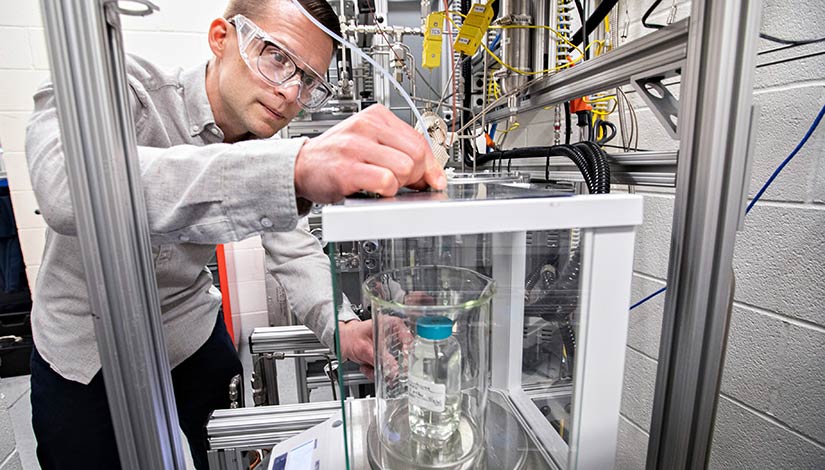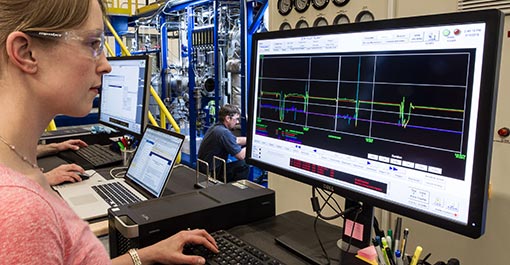Net-Zero-Emission Biofuels
NREL develops the next-generation of net-zero-emission biofuels to help decarbonize the heavy haulers of the global transportation ecosystem, including the aviation, marine, and trucking sectors.


Partner with NREL to overcome barriers to scaling or commercializing your biofuel technology.
Aviation, marine, and trucking are among the most difficult transportation sectors to decarbonize. NREL researchers are developing processes to convert widely available biomass and waste feedstocks into sustainable biofuels that reduce greenhouse gas (GHG) emissions by at least 100% compared to petroleum-based fuels.
Using state-of-the-art bioenergy research facilities and coupled with powerful modeling and analysis, NREL is supporting the rapid deployment of biofuel technologies in concert with industrial partners.
Featured Projects

Sustainable Aviation Fuel From Wet Waste
Wet waste—including food waste, manure, sewage, and inedible fats, oils, and greases—is a large source of methane emissions, a pollutant over 20 times more potent than carbon dioxide. NREL scientists and partners are scaling a biorefining process that upgrades wet waste into sustainable aviation fuel both compatible with existing jet engines and capable of supporting net-zero-carbon flight. A forthcoming project will analyze the fuel’s performance and conduct a flight demonstration, a test case for enabling U.S. airlines to meet self-imposed climate goals.
Principal investigator: Calvin Mukarakate

Marine Biofuels From Biomass
Marine biofuels produced from biomass can reduce life cycle GHG emissions 67%–93% compared to heavy fuel oil commonly used in ships globally, according to a marine biofuels study by NREL scientists and others. NREL research helps establish the feasibility of using biofuels to help shipping companies comply with limits on sulfur oxides and GHG emissions issued by the International Maritime Organization.
Principal investigator: Eric Tan

Bioblendstocks for Heavy-Duty Trucks
The diesel-fueled mixing-controlled compression ignition engines often found in commercial freight trucks deliver strong power and fuel economy. However, these engines require costly and complex control systems to meet emission regulations. NREL researchers and others in the U.S. Department of Energy’s Co-Optimization of Fuels and Engines initiative are researching bioblendstocks that reduce GHG emissions by more than 60% compared to petroleum fuel.
Principal investigator: Robert McCormick
Sustainable Aviation Fuel From Wood Waste and Regenerative-Agriculture Biomass
In partnership with Alder Energy, NREL is advancing a refining pathway that upgrades bio-oil into cycloparaffin sustainable aviation fuel (SAF). The technology could help process standing dead wood biomass in California that has led to forest fire outbreaks, as well as emerging agricultural crops in the Midwest that sink carbon into the soil for large GHG reductions.
Principal investigator: Calvin Mukarakate
Corn Stover to Cyclohexane-Rich Sustainable Aviation Fuel
Combined with process and catalyst innovations at partner universities and labs, NREL’s deacetylation and mechanical refining process makes it possible to convert corn stover into cycloparaffin-based SAF—a potential boon to U.S. corn farmers.
Principal investigator: Xiaowen Chen
Sustainable Aviation Fuel From 2,3-Butanediol
NREL has developed a novel fermentation process to upgrade biomass sugars into 2,3-butanediol, a precursor for low-emission SAF hydrocarbons. Researchers are scaling the process, performing techno-economic and life cycle analysis to understand barriers to bringing the technology to the market.
Principal investigator: Nancy Dowe
Our Expertise
Biochemical Processes
NREL is advancing processes that use enzymes, microbes, and catalysts to deconstruct and upgrade biomass into sugar-derived intermediates for upgrading into renewable fuels.
Principal investigator: Michael Guarnieri
Catalytic Carbon Transformation
NREL leads innovation in the catalytic conversion of renewable and waste carbon sources, discovering pathways for recycling carbon into drop-in and advantaged fuels.
Principal investigator: Fred Baddour
Techno-Economic, Sustainability, and Market Analysis
From greenhouse gas emissions to process cost drivers to investment decision-making, NREL is analyzing the numerous economic, environmental, and social vectors that shape the deployment of net-zero-emission fuels.
Principal investigator: Ling Tao
Related Research
Chemical Catalysis for Bioenergy Consortium
Led by NREL, ChemCatBio accelerates the development of catalytic technologies critical for converting biomass into fuels and chemicals with a lower carbon footprint.
Principal investigator: Dan Ruddy
U.S. Department of Energy Co-Optimization of Fuels & Engines Initiative
In partnership with NREL and other national labs, this initiative systematically assesses hundreds of hydrocarbons and oxygenates to evaluate their potential as low-net-carbon bioblendstocks.
Principal investigator: Robert McCormick
Sustainable Aviation Research
NREL is uniquely positioned to develop decarbonization solutions that address all energy aspects of the aviation ecosystem—from net-zero-carbon fuels to infrastructure optimization and aircraft propulsion technologies.
Principal investigator: Brett Oakleaf
Publications
Toward Net-Zero Sustainable Aviation Fuel With Wet Waste–Derived Volatile Fatty Acids, Proceedings of the National Academy of Sciences (2021)
U.S. Airport Infrastructure and Sustainable Aviation Fuel, NREL Technical Report (2021)
Adoption of Biofuels for the Marine Shipping Industry: A Long-Term Price and Scalability Assessment, NREL Technical Report (2021)
Biofuel Options for Marine Applications: Technoeconomic and Life-Cycle Analyses, Environmental Science and Technology (2021)
Potential Avenues for Significant Biofuels Penetration in the U.S. Aviation Market, NREL Technical Report (2017)
Well-to-Wake Analysis of Ethanol-to-Jet and Sugar-to-Jet Pathways, Biotechnology for Biofuels (2017)
U.S. Department of Energy Support
This program is funded in part by the U.S. Department of Energy's Bioenergy Technologies Office.
Contact
Share
